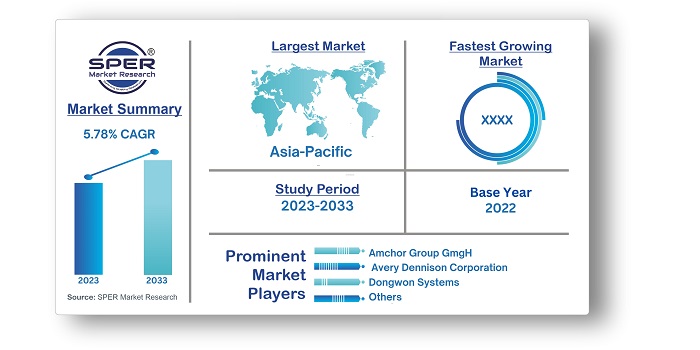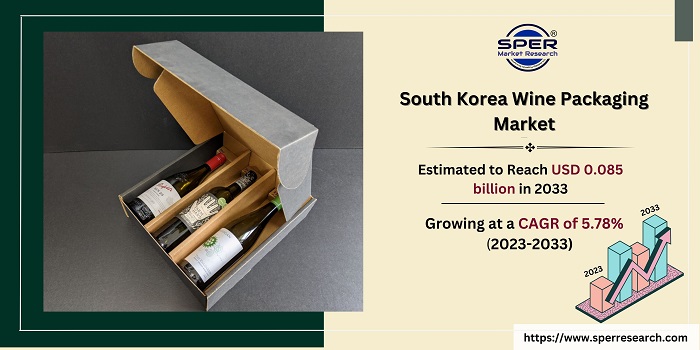
South Korea Wine Packaging Market Growth, Size, Trends, Revenue, Challenges and Future Outlook
South Korea Wine Packaging Market Size- By Material Type, By Product, By Sales Channel- Regional Outlook, Competitive Strategies and Segment Forecast to 2033
| Published: May-2023 | Report ID: PACK2314 | Pages: 1 - 106 | Formats*: |
| Category : Packaging | |||


| Report Metric | Details |
| Market size available for years | 2019-2033 |
| Base year considered | 2022 |
| Forecast period | 2023-2033 |
| Segments covered | By Material Type, By Product, By Sales Channel |
| Regions covered | Eastern Region, Northern Region, Southern Region, |
| Companies Covered | Amchor Group GmgH, Avery Dennison Corporation, Dongwon Systems, International paper Company, SIG Group, Tetra Pak Group, Others. |
- Wineries and Vineyards
- Wine distributors and Retailers
- Wine enthusiasts
- Restaurants and bars
- Event planners and caterers
- South Korea Wine Packaging Market Value Share and Forecast, By Material Type, 2023-2033
- Glass
- Metal
- Paper Board
- Plastics
- South Korea Wine Packaging Market Value Share and Forecast, By Products, 2023-2033
- Bottles
- Bag in Box
- Closures
- Others
- South Korea Wine Packaging Market Value Share and Forecast, By Sales Channel, 2023-2033
- Offline
- Online
- Eastern Region
- Northern Region
- Southern Region
- South Korea Wine Packaging Market Size (FY’2023-FY’2033)
- Overview of South Korea Wine Packaging Market
- Segmentation of South Korea Wine Packaging Market By Material Type (Glass, Metal, paper Board, Plastics)
- Segmentation of South Korea Wine Packaging Market By Product (Bottles, Bag in Box, Closure, Others)
- Segmentation of South Korea Wine Packaging Market By Sales Channel (Offline, Online)
- Statistical Snap of South Korea Wine Packaging Market
- Growth Analysis of South Korea Wine Packaging Market
- Problems and Challenges in South Korea Wine Packaging Market
- Competitive Landscape in the South Korea Wine Packaging Market
- Impact of COVID-19 and Demonetization on South Korea Wine Packaging Market
- Details on Recent Investment in South Korea Wine Packaging Market
- Competitive Analysis of South Korea Wine Packaging Market
- Key Players in the South Korea Wine Packaging Market
- SWOT Analysis of South Korea Wine Packaging Market
- South Korea Wine Packaging Market Future Outlook and Projections (FY’2023-FY’2033)
- Recommendations from Analyst
1.1. Scope of the report1.2. Market segment analysis
2.1. Research data source2.1.1. Secondary Data2.1.2. Primary Data2.1.3. SPER’s internal database2.1.4. Premium insight from KOL’s2.2. Market size estimation2.2.1. Top-down and Bottom-up approach2.3. Data triangulation
4.1. Driver, Restraint, Opportunity and Challenges analysis4.1.1. Drivers4.1.2. Restraints4.1.3. Opportunities4.1.4. Challenges4.2. COVID-19 Impacts of the South Korea Wine Packaging Market
5.1. SWOT Analysis5.1.1. Strengths5.1.2. Weaknesses5.1.3. Opportunities5.1.4. Threats5.2. PESTEL Analysis5.2.1. Political Landscape5.2.2. Economic Landscape5.2.3. Social Landscape5.2.4. Technological Landscape5.2.5. Environmental Landscape5.2.6. Legal Landscape5.3. PORTER’s Five Forces5.3.1. Bargaining power of suppliers5.3.2. Bargaining power of buyers5.3.3. Threat of Substitute5.3.4. Threat of new entrant5.3.5. Competitive rivalry5.4. Heat Map Analysis
6.1. South Korea Wine Packaging Market Manufacturing Base Distribution, Sales Area, Product Type6.2. Mergers & Acquisitions, Partnerships, Product Launch, and Collaboration in South Korea Wine Packaging Market
7.1. South Korea Wine Packaging Market Value Share and Forecast, By Material Type, 2023-20337.2. Glass7.3. Metal7.4. Paper Board7.5. Plastics
8.1. South Korea Wine Packaging Market Value Share and Forecast, By Products, 2023-20338.2. Bottles8.3. Bag in Box8.4. Closures8.5. Others
9.1. South Korea Wine Packaging Market Value Share and Forecast, By Sales Channel, 2023-20339.2. Offline9.3. Online
10.1. South Korea Wine Packaging Market Size and Market Share
11.1. South Korea Wine Packaging Market Size and Market Share by Material Type (2019-2026)11.2. South Korea Wine Packaging Market Size and Market Share by Material Type (2027-2033)
12.1. South Korea Wine Packaging Market Size and Market Share by Product (2019-2026)12.2. South Korea Wine Packaging Market Size and Market Share by Product (2027-2033)
13.1. South Korea Wine Packaging Market Size and Market Share by Sales Channel (2019-2026)13.2. South Korea Wine Packaging Market Size and Market Share by Sales Channel (2027-2033)
14.1. South Korea Wine Packaging Market Size and Market Share by Region (2019-2026)14.2. South Korea Wine Packaging Market Size and Market Share by Region (2027-2033)14.3. Eastern Region14.4. Northern Region14.5. Southern Region
15.1. Amcor group GmgH15.1.1. Company details15.1.2. Financial outlook15.1.3. Product summary15.1.4. Recent developments15.2. Avery Dennison Corporation15.2.1. Company details15.2.2. Financial outlook15.2.3. Product summary15.2.4. Recent developments15.3. Dongwon Systems15.3.1. Company details15.3.2. Financial outlook15.3.3. Product summary15.3.4. Recent developments15.4. International Paper Company15.4.1. Company details15.4.2. Financial outlook15.4.3. Product summary15.4.4. Recent developments15.5. SIG Group15.5.1. Company details15.5.2. Financial outlook15.5.3. Product summary15.5.4. Recent developments15.6. Tetra Pak Group15.6.1. Company details15.6.2. Financial outlook15.6.3. Product summary15.6.4. Recent developments15.7. Others15.7.1. Company details15.7.2. Financial outlook15.7.3. Product summary15.7.4. Recent developments15.8. The Estée Lauder Companies Inc.15.8.1. Company details15.8.2. Financial outlook15.8.3. Product summary15.8.4. Recent developments15.9. Unilever PLC15.9.1. Company details15.9.2. Financial outlook15.9.3. Product summary15.9.4. Recent developments15.10. Yves Rocher15.10.1. Company details15.10.2. Financial outlook15.10.3. Product summary15.10.4. Recent developments
SPER Market Research’s methodology uses great emphasis on primary research to ensure that the market intelligence insights are up to date, reliable and accurate. Primary interviews are done with players involved in each phase of a supply chain to analyze the market forecasting. The secondary research method is used to help you fully understand how the future markets and the spending patterns look likes.
The report is based on in-depth qualitative and quantitative analysis of the Product Market. The quantitative analysis involves the application of various projection and sampling techniques. The qualitative analysis involves primary interviews, surveys, and vendor briefings. The data gathered as a result of these processes are validated through experts opinion. Our research methodology entails an ideal mixture of primary and secondary initiatives.



Frequently Asked Questions About This Report
PLACE AN ORDER
Year End Discount
Sample Report
Pre-Purchase Inquiry
NEED CUSTOMIZATION?
Request CustomizationCALL OR EMAIL US
100% Secure Payment






Related Reports
Our Global Clients
Our data-driven insights have influenced the strategy of 200+ reputed companies across the globe.




















